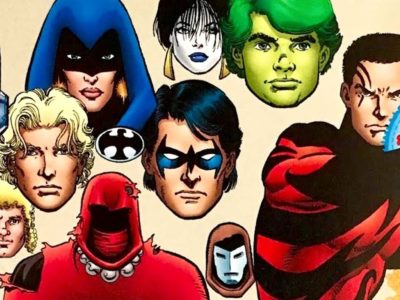
[ad_1]
Bliss by Sean Lewis and Caitlin Yarsky compellingly explores family, trauma, and the mistakes people make that can never be truly forgotten.
Everybody has done something they wish they could forget, but leaving the past behind is often easier said than done. That concept lives at the heart of Bliss, an imaginative eight-issue series from Image Comics whose collection hits shelves July 21. Co-created by writer Sean Lewis and artist Caitlin Yarsky, Bliss centers its story around “Bliss,” a drug that allows users to forget their past by crying out memories. The series provides a unique perspective on familial trauma while Gods, monsters, and crime syndicates keep the action moving. Bliss is a fascinating tale that forces readers to question what they would do to keep their family safe.
Bliss opens with Perry Ohara testifying in court on behalf of his father, Benton Ohara. Benton is on trial for crimes he committed while working for the Street Gods, an unlawful family that distributes Bliss to Feral City’s streets. While Bliss allows users to forget their pasts, it doesn’t erase their sins, and Benton’s have finally caught up to him. While Perry tells the story of how his father became a mass murderer to protect him, the past comes back to haunt them. And the monstrous goddess Lethe seeks to satisfy her unquenchable thirst for human memories.
Lewis (Superman) embeds Bliss with a wealth of heart, making Perry and Benton dynamic protagonists. Perry’s inner turmoil reflects his troubled youth while Benton is forced to live with the knowledge that he may never be able to redeem himself for what he did for his family. Their personal struggles come across as particularly poignant in the book’s many flashbacks, especially as Benton’s strained relationship with Mabel, Perry’s mother, slowly falls apart. This character work grounds Bliss as it takes on concepts such as otherworldly gods and mind-erasing drugs. These ideas are well-thought-out and depict that everybody has regrets, but, it is how people live with them that reveals who they truly are.
Yarsky’s surreal artwork transforms the narrative into something sublime. Every page of Bliss offers exciting visual ideas. Panel layouts defy convention as Yarsky often melds backgrounds into the framing of other images. Beyond that, Yarsky often uses extreme foreshortening — a technique that makes the action feel more intense and heightens the surreal state of mind that many Bliss users experience.
However, it is Yarsky’s grasp on emotion that makes this series stand out. As the back half of this collection shows, Yarsky used photo-reference for many of the characters, which allowed her to capture nuanced feelings like contempt, impatience, and betrayal. These complex moments help the series stand out, and should entice readers to follow Yarsky as she takes on art duties for the upcoming Black Hammer: Reborn.
At the end of the collected edition of Bliss, Lewis reflects on his relationship with his father and how it shaped his dynamic with his son. This coda is drawn by Yarsky and is a deeply intimate look into the thought process that shaped the series. Though it’s only five pages long, this addition provides a lot of value and will surely make readers want to go back through this heartfelt journey all over again, armed with a new way of contextualizing the work.
Overall, Bliss is an incredible series that captures the complexities of trauma and living with regret. The book uses surreal aesthetics and high-concept fantasy to provide a unique perspective on the hardships people will endure for those they love. Together, Sean Lewis and Caitlin Yarsky have crafted a unique story that doesn’t need a multitude of superheroes to feel like a transformative work of art. With strong characters, heartfelt emotion, and intense action, Bliss belongs next to Sandman, Monstress, and Saga as a staple of the fantasy genre.
About The Author
[ad_2]





